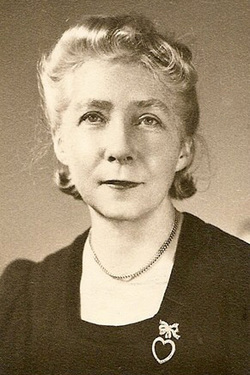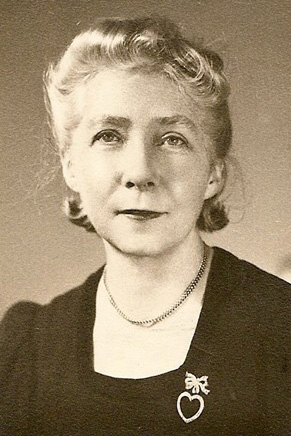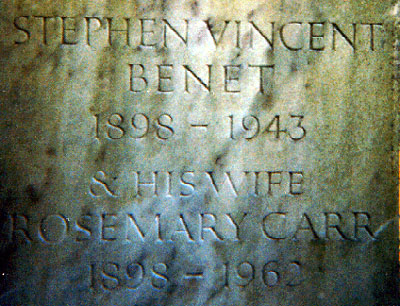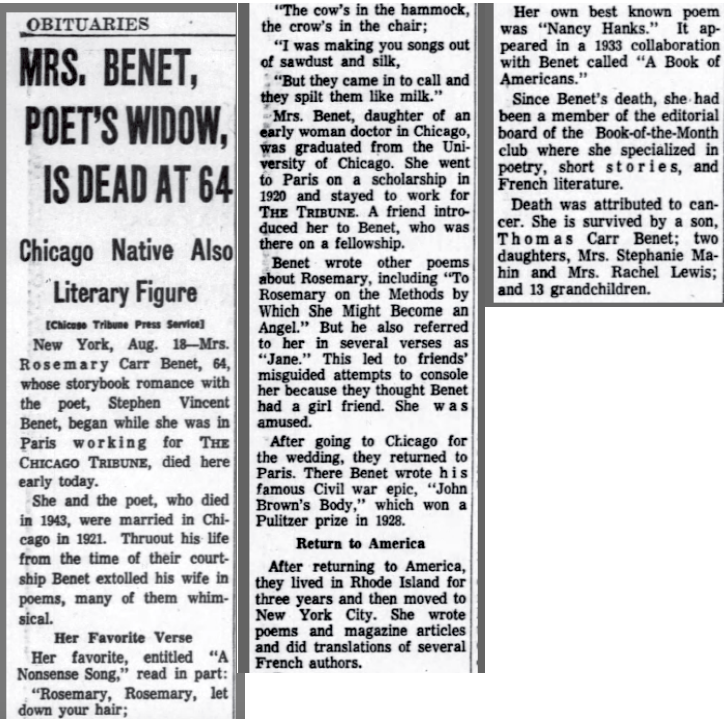"I can't describe her on paper very well, except to say that she is clever, pretty, has a magnificent sense of humor, adventurous, gallant, whimsical, kind, merry, and courageous. She is so infinitely the finest and most lovely person I have ever known."
— Stephen Vincent Benét describing his beloved wife, Rosemary.
Rosemary Carr Benét Is Dead; Author, 65, Was Widow of Poet
The New York Times, 19 Aug 1962
Rosemary Carr Benét, the widow of the poet Stephen Vincent Benét, died of cancer yesterday in Harkness Pavilion at Columbia-Presbyterian Medical Center. She was 65 years old and had lived at 157 East 75th Street.
Since her husband's death in 1943, Mrs. Benét, also a poet, had been on the editorial board of the Book-of-the-Month Club, specializing in poetry, short stories and French literature. Her best-known poem is "Nancy Hanks," which appeared in A Book of Americans, a 1933 collaboration with her husband.
A native of Chicago, where her mother was an early woman doctor, Mrs. Benét was graduated from the University of Chicago, where she earned a Phi Beta Kappa key in her junior year. Later Mr. Benét, whose grades at Yale had not been the highest, took pleasure in citing his wife's scholastic achievements.
After her graduation Mrs. Benét went to Paris on a scholarship. She stayed to write for The Chicago Tribune. An old friend, Mrs. Charles Myers, introduced her to Mr. Benét, who was working under a fellowship on The Beginning of Wisdom. Mr. Benét began a lifelong practice of celebrating his love for his wife through poetry. Among these often whimsical poems are, "A Sad Song," "To Rosemary on the Methods by Which She Might Become an Angel" and "A Nonsense Song."
In most of these poems, he called her "Rosemary," but in several he referred to her as "Jane." Mr. Benét's biographer, Charles A. Fenton, noted that Mrs. Benét was amused by well intentioned friends who occasionally sympathized with a poet's wife whose husband, they imagined, was publishing poetry inspired by another woman.
After marrying in Chicago in 1921, the couple returned to Paris, where Mr. Benét wrote his most famous work, "John Brown's Body." This epic poem of the Civil War has been called the "American Iliad" and won the Pulitzer Prize for 1929. While in Paris, the Benéts met Ernest Hemingway and F. Scott Fitzgerald, but they were too poor to join the literary and artistic swirl of Paris in the Twenties.
After having lived in Rhode Island for three yers, the Benéts moved here. They bought the house in Stonington, Conn., where the painter James Whistler lived as a boy, and Mrs. Benét always looked forward to spending summers there.
Mrs. Benét was never as prolific as her husband and since her death she had devoted most of her time to the book club. She was known there for her catholic tastes, and her judgment was highly regarded. Last year she served as a judge of the first John P. Marquand Award for a first novel. In addition to writing poems and magazine articles, she had translated into English the works of several French authors including Colette.
She is survived by three children, Thomas Carr Benét, Mrs. Stephanie Benét Mahin, Mrs. Rachel Benét Lewis, and thirteen grandchildren.
[with minor edits]
"I can't describe her on paper very well, except to say that she is clever, pretty, has a magnificent sense of humor, adventurous, gallant, whimsical, kind, merry, and courageous. She is so infinitely the finest and most lovely person I have ever known."
— Stephen Vincent Benét describing his beloved wife, Rosemary.
Rosemary Carr Benét Is Dead; Author, 65, Was Widow of Poet
The New York Times, 19 Aug 1962
Rosemary Carr Benét, the widow of the poet Stephen Vincent Benét, died of cancer yesterday in Harkness Pavilion at Columbia-Presbyterian Medical Center. She was 65 years old and had lived at 157 East 75th Street.
Since her husband's death in 1943, Mrs. Benét, also a poet, had been on the editorial board of the Book-of-the-Month Club, specializing in poetry, short stories and French literature. Her best-known poem is "Nancy Hanks," which appeared in A Book of Americans, a 1933 collaboration with her husband.
A native of Chicago, where her mother was an early woman doctor, Mrs. Benét was graduated from the University of Chicago, where she earned a Phi Beta Kappa key in her junior year. Later Mr. Benét, whose grades at Yale had not been the highest, took pleasure in citing his wife's scholastic achievements.
After her graduation Mrs. Benét went to Paris on a scholarship. She stayed to write for The Chicago Tribune. An old friend, Mrs. Charles Myers, introduced her to Mr. Benét, who was working under a fellowship on The Beginning of Wisdom. Mr. Benét began a lifelong practice of celebrating his love for his wife through poetry. Among these often whimsical poems are, "A Sad Song," "To Rosemary on the Methods by Which She Might Become an Angel" and "A Nonsense Song."
In most of these poems, he called her "Rosemary," but in several he referred to her as "Jane." Mr. Benét's biographer, Charles A. Fenton, noted that Mrs. Benét was amused by well intentioned friends who occasionally sympathized with a poet's wife whose husband, they imagined, was publishing poetry inspired by another woman.
After marrying in Chicago in 1921, the couple returned to Paris, where Mr. Benét wrote his most famous work, "John Brown's Body." This epic poem of the Civil War has been called the "American Iliad" and won the Pulitzer Prize for 1929. While in Paris, the Benéts met Ernest Hemingway and F. Scott Fitzgerald, but they were too poor to join the literary and artistic swirl of Paris in the Twenties.
After having lived in Rhode Island for three yers, the Benéts moved here. They bought the house in Stonington, Conn., where the painter James Whistler lived as a boy, and Mrs. Benét always looked forward to spending summers there.
Mrs. Benét was never as prolific as her husband and since her death she had devoted most of her time to the book club. She was known there for her catholic tastes, and her judgment was highly regarded. Last year she served as a judge of the first John P. Marquand Award for a first novel. In addition to writing poems and magazine articles, she had translated into English the works of several French authors including Colette.
She is survived by three children, Thomas Carr Benét, Mrs. Stephanie Benét Mahin, Mrs. Rachel Benét Lewis, and thirteen grandchildren.
[with minor edits]
Family Members
Sponsored by Ancestry
Advertisement
Records on Ancestry
Advertisement












